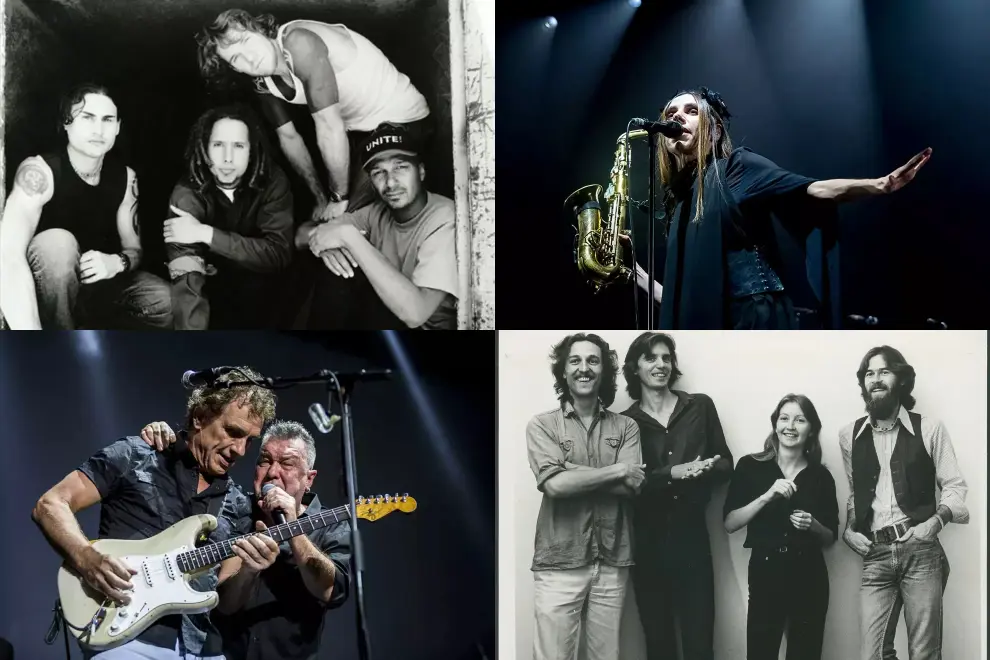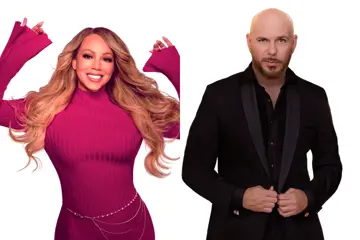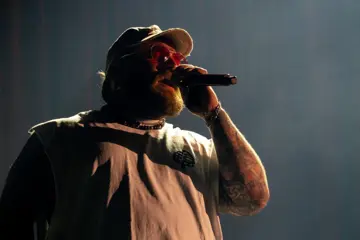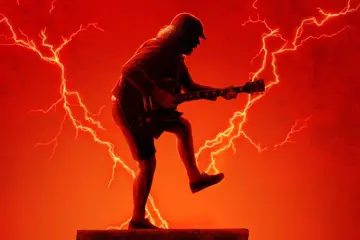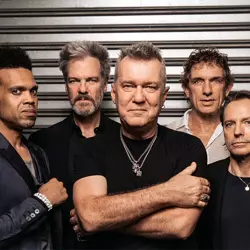 Cold Chisel
Cold ChiselBlood on the tracks. As the world lurches closer to World War III, with the Israel-Hamas conflict escalating into a year-long war on Gaza and now devastating Lebanon, it’s time to revisit powerful anti-war songs to motivate us to unify and speak out against ongoing, senseless violence.
Some like John Lennon and Yoko Ono’s Give Peace A Chance and Edwin Starr’s War (What Is It Good For?) took hold because they were designed primarily as chants for rallies. System Of A Down’s Grammy-winning single, B.Y.O.B., inspired an entire generation to stand against the Iraq War when they screamed, “Why don’t presidents fight the war? Why do they always send the poor?”
Others creatively found ways to express the horrors of war.
Some didn’t even need words. Of all the anti-Vietnam war rhetoric at the 1969 Woodstock festival, Jimi Hendrix made the most significant statement with an electronic rendition of the US national anthem, The Star Spangled Banner, creating effects to denote bombs falling from American planes on unarmed Vietnam civilians and babies below.
Here are another 15 powerful anti-war songs to inspire listeners and artists alike.
Bulls On Parade – Rage Against The Machine (1996)
On Bulls On Parade, Rage Against The Machine delivered a punch against the unholy alliance between arms dealers and the military with lines such as, "Weapons, not food, not homes, not shoes, not need, just feed the war cannibal-animal."
At the time, Tom Morello was hailed as the most inventive and exciting US guitarist. Here, he pushed his ‘Arm The Homeless’ S-style guitar to spray proceedings with wah-wah and a vinyl scratch effect by toggling between two pickups.
Ohio – Crosby, Stills, Nash & Young (1970)
On May 4, 1970, students at US college Kent State in Ohio held demonstrations on campus protesting the bombing of Cambodia by the American military. The National Guard was sent in, and shots were fired. Four students died.
The counterculture had long suffered at the hands of state-sponsored violence at peace rallies. This was the first time young Americans had been shot and in a place of learning and independent thought. It was stunned and angry.
When Neil Young saw the stark blood-stained photos in Life magazine, he walked into a forest near his house and wrote the song in an hour.
David Crosby, Stephen Stills and Graham Nash were spread across the world on holiday. They were recalled, nailing it in three live takes. Crosby burst into tears when he heard the final product. In ten days, the song was in the shops.
Why Ohio remains one of the great anthems of our times is the way it combines the political…
Tin soldiers and Nixon's comin'
We're finally on our own
This summer I hear the drummin'
Four dead in Ohio
…and the personal:
What if you knew her and
Found her dead on the ground?
How can you run when you know?
Students went on strike across America, and colleges were closed. “We were killing our own children,” Nash said, “and we were killing them in support of a secret policy of slaughter on a mass scale.”
The Nixon administration condemned the students’ actions and the song. Mainstream media agreed, and some radio banned Ohio.
Nixon went on to win re-election in 1972. He won a majority in the state of Ohio by a margin of over 21 per cent.
Eve Of Destruction – Barry McGuire (1965)
The god-daddy of protest songs covered everything in its sight – the Vietnam War, the draft, the nuclear war, the Civil Rights Movement, the Kennedy assassination, turmoil in the Middle East and the American space program.
Written by quirky folkie PF Sloan, it has been recorded numerous times. The most popular version was by Barry McGuire of the popular folk group New Christy Minstrels, reaching No. 1 in America, No. 2 in Australia and No. 3 in Britain.
Ironically, it almost didn’t see the light of day. The Byrds turned it down. McGuire preferred three other Sloan songs. He cut Eve Of Destruction as a b-side in one take, reading lyrics scrawled on a crumpled piece of paper. The vocal was rushed, to be re-recorded a week after. But it got slipped to DJs who played it, and it became a monster hit.
It was banned by some radio stations, on the grounds it was “an aid to the enemy in Vietnam".
Khe Sanh – Cold Chisel (1978)
Khe Sanh, taking its name from the capital of Vietnam’s Hướng Hóa District, captured the despair of Australian vets returning from the war only to be ghosted by mainstream society and even some of the Returned Services League.
The song’s character recalled:
I left my heart to the sappers round Khe Sanh
And my soul was sold with my cigarettes to the black market man
I've had the Vietnam cold turkey
From the ocean to the Silver City
And it's only other vets could understand.
The awesome song followed the character as he dealt with post-traumatic stress disorder and addiction, working on oil rigs and flying helicopters and trying to find an answer to his emptiness. Other Vietnam vets suffer even more today, including constant suicidal thoughts.
Scorn Of The Women – Weddings, Parties, Anything (1987)
A damaging effect of war is the glorification of soldiers and the jeers of cowardice aimed at people who weren’t in the thick of the battle.
The character in Melbourne folk-punk Weddings, Parties, Anything’s Scorn Of The Women signed up to fight. But he had bad eyesight, so he worked on a defence base fixing aircraft and contributed to the war effort that way. But he was condemned by others.
So don't sing no songs about Waltzing Matilda
Don't tell me I tried, don't tell me I failed
'Cos all I recall is the scorn of the women
And the white feather that I received in the mail.
Gertrude Street Blues – Chain (1970)
Early blues band Chain recalled the joy of joining massive anti-Vietnam war rallies in Melbourne’s central business district and getting beaten up by the police.
The Dogs Of War – Pink Floyd (1987)
Co-written by guitarist Dave Gilmour about greedy, corrupt politicians with close ties to the military and arms dealers, it was thought to be inspired by Ronald Reagan.
Included on A Momentary Lapse Of Reason, the track features a guest slot from Vanilla Fudge’s Carmine Appice. The official reason was that Floyd drummer Nick Mason had been busy racing his expensive fleet of cars, “and my calluses are soft.” The real story is that by then, Floyd were virtually collapsing as a working band, and the album roped in guest players.
Bomb The World – Michael Franti & Spearhead (2003)
The New Internationalist described Bomb The World as "the anthem of a new generation of anti-war protesters" for its "stirring chorus" and its "coda ready-made for marching.”
In peace rallies around the world, thousands would protest the invasion of Iraq by chanting “We can bomb the world to pieces but we can’t bomb it into peace.” Despite its aggressive tone, Franti, a disciple of peaceniks Martin Luther King Jr. and Mahatma Gandhi, said, “Everything I sing about is love, respect and oneness.”
The Words That Maketh Murder – PJ Harvey (2011)
The Words That Maketh Murder was PJ Harvey’s condemnation of the failure of diplomacy in the first two world wars and the lengthy Afghanistan conflict. It asked, "What if I take my problem to the United Nations?"
Harvey: “I knew that I wanted the music to offset the weight of the words. That was very important. I wanted the music to be full of energy and to be very uplifting and unifying, almost insightful in its creation of energy.
“It took me a long time to find out how to sing such words because to sing it in the wrong voice would have given it the wrong feeling – maybe too self-important and dogmatic. I wanted the songs to be much more ambiguous than that. This was the way that the language was best moved from lip to ear.”
Fortunate Son – Creedence Clearwater Revival (1970)
John Fogerty and Doug Clifford enlisted in the Army Reserves from 1966 to 1968, so Fogerty had an affection for those serving in Vietnam. The song, penned in 20 minutes in his bedroom, came at a time when 80 per cent of Americans supported the war, abetted by the mainstream media.
With lines like “some folks are born silver spoon in hand” and “I ain’t no senator’s son…I ain’t no fortunate one”, it expressed resentment that the children of powerful finance, military and political families (including future President George W. Bush) “were given a deferment from the military or a choice position in the military”, he wrote in his 2015 memoir.
Fortunate Son was also adopted as a working class anthem, and covered extensively including by Bruce Springsteen, U2, Bob Seger, Death Cab For Cutie, The Screaming Jets and Kid Rock. It is now also used in movies and games.
Fogerty said that the people targeted in the song decades before were still enjoying privilege.
He cited the time when President Donald Trump wanted a photo opportunity at Washington’s Lafayette Park and used federal troops to clear the area so he could pose in front of St. John’s Church with a copy of The Bible.
“It's a song I could have written now, so I find it confusing that the President has chosen to use my song for his political rallies when in fact, it seems like he is probably the Fortunate Son."
Morning Dew – Bonnie Dobson (1962)
Unknown Canadian folk singer-songwriter Bonnie Dobson wrote this beautiful ballad about a conversation between the last woman and last man in a post-nuclear holocaust world.
US folkie Tim Rose did a cover and claimed part songwriter credit.
Dobson’s bitterness over this worsened when it was covered by many folks, including The Grateful Dead, The National, Robert Plant, Jeff Beck (lots of wah-wah and Rod Stewart on mic duties), Long John Baldry, Nazareth, Einstürzende Neubauten (horror film backing, growling vocal), Devo, Clannad, and a hit by Lulu with an aggressive arrangement by pre-Zeppelin John Paul Jones.
She got her full sole royalties in 1998 after she sued Rose. In 2013, Robert Plant invited her to sing Morning Dew with him at his show at London’s Royal Festival Hall. She said, “[Robert] gave me back my song that night.”
Universal Soldier – Buffy Sainte-Marie (1964)
Canadian singer-songwriter Buffy Sainte-Marie wrote the much-covered Universal Soldier as an argument about people power between a college student and her professor.
The student believed that we who vote in politicians should bear the blame if their country goes to war. The song described how soldiers of every race, religion, colour, and size throughout history went to war thinking they were bringing peace when they were, in fact, part of the problem.
Jan Berry, of US surf duo Jan and Dean, recorded an answer song called The Universal Coward, which slams anti-war protesters.
I Was Only 19 (A Walk In The Light Green) – Redgum (1983)
Another song about the awful impact of war on young soldiers, in this case, a real-life story about one of the 50,000 Aussies who fought in Vietnam. In this case, it was partly about 19-year-old Frankie Hunt, who, during a routine patrol, tripped a mine, losing three inches of a leg and receiving shrapnel wounds on 90% of his body.
In 1979, the Vietnam Veterans Association of Australia was going public about the trauma, financial and medical, facing returned soldiers. This song, written 15 minutes after extensively hearing stories from ex-soldiers by leader John Schumann, went a long way to the government addressing the betrayal of these men.
Jet Fighter – Butthole Surfers (2001)
It followed an American hotshot Air Force pilot on a bombing raid above Beirut.
The fighter banked into the night, then he caught a Sam
He rose up into Heaven with Jesus in his hand
Scenery was so beautiful, could not believe his eyes
Then he spotted John Wayne, he knew he had arrived
Jesus interrupted him, he had something to tell
They had to speak with Allah, and he sent them both to Hell!
Boom, boom!
Bullet The Blue Sky – U2 (1987)
In July 1986, Bono and his wife Ali visited Nicaragua and El Salvador and saw first-hand how US military intervention was destroying the lives of rural people.
Bono: "I remember the ground shaking, and I remember the smell, I suppose, of being near a war zone. I don't think we were in danger, but I knew there were lives in danger or being lost close to us, and I felt for them.
“It upset me as a person who read the Scriptures to think that Christians in America were supporting this kind of thing, this kind of proxy war because of these Communists."
The song came out of a 20-minute jam, with exhilarating piercing guitar which was the result of the singer telling The Edge, "Put El Salvador through an amplifier!”

